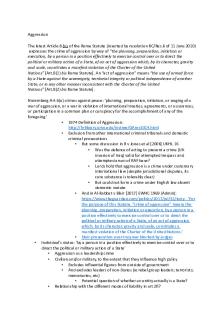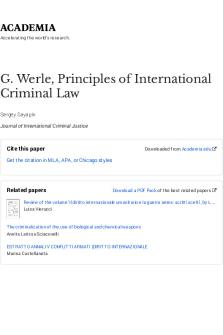Aggression - International Criminal Law PDF

| Title | Aggression - International Criminal Law |
|---|---|
| Author | dee ss |
| Course | International Criminal Law |
| Institution | City University London |
| Pages | 3 |
| File Size | 69.4 KB |
| File Type | |
| Total Downloads | 10 |
| Total Views | 185 |
Summary
International Criminal Law...
Description
Aggression The latest Article 8 bis of the Rome Statute (inserted by resolution RC/Res.6 of 11 June 2010) expresses the crime of aggression by way of “the planning, preparation, initiation or execution, by a person in a position effectively to exercise control over or to direct the political or military action of a State, of an act of aggression which, by its character, gravity and scale, constitutes a manifest violation of the Charter of the United Nations” [Art.8(1) bis Rome Statute]. An “act of aggression” means “the use of armed force by a State against the sovereignty, territorial integrity or political independence of another State, or in any other manner inconsistent with the Charter of the United Nations” [Art.8(2) bis Rome Statute]. Nuremberg Art 6(a) crimes against peace: ‘planning, preparation, initiation, or waging of a war of aggression, or a war in violation of international treaties, agreements, or assurances, or participation in a common plan or conspiracy for the accomplishment of any of the foregoing.’ • 1974 Definition of Aggression: http://hrlibrary.umn.edu/instree/GAres3314.html • Exclusion from other international criminal tribunals and domestic criminal prosecutions • But some discussion in R v Jones et al [2006] UKHL 16 • Was the defence of acting to prevent a crime (UK invasion of Iraq) valid for attempted trespass and attempted arson of RAF base? • Lords hold that aggression is a crime under customary international law (despite jurisdictional disputes, its core substance is tolerably clear) • But could not form a crime under English law absent domestic statute • And in Al-Rabbat v Blair [2017] EWHC 1969 (Admin): https://www.theguardian.com/politics/2017/jul/31/tony- ‘For the purpose of this Statute, “crime of aggression” means the planning, preparation, initiation or execution, by a person in a position effectively to exercise control over or to direct the political or military action of a State, of an act of aggression which, by its character, gravity and scale, constitutes a manifest violation of the Charter of the United Nations.’ • blair-prosecution-over-iraq-war-blocked-by-judges • Individual’s status: ‘by a person in a position effectively to exercise control over or to direct the political or military action of a State’ • Aggression as a leadership crime • Civilian and/or military, to the extent that they influence high policy • Excludes influential figures from outside of government • And excludes leaders of non-States (ie rebel group leaders; terrorists; mercenaries, etc) • Potential question of whether an entity actually is a State? • Relationship with the different modes of liability in art 25?
25(3)bis: alternate modes ‘apply only to persons in a position effectively to exercise control over or to direct the political or military action of a State’ Prohibited State conduct: ‘of an act of aggression’ • For the purpose of paragraph 1, “act of aggression” means the use of armed force by a State against the sovereignty, territorial integrity or political independence of another State, or in any other manner inconsistent with the Charter of the United Nations. Any of the following acts, regardless of a declaration of war, shall, in accordance with United Nations General Assembly resolution 3314 (XXIX) of 14 December 1974, qualify as an act of aggression: • Invading another state; • Bombing another state; • Blockading the ports or coastlines of another state; • Attacking the land, sea, or air forces, or marine or sea fleets of another state; • Violating a status of forces agreement; • Using armed bands, groups, irregulars or mercenaries against another state; • Allowing territory to be used by another state to perpetrate an act of aggression against a third state Jurisdiction over aggression • Jurisdiction for ‘crimes of aggression committed one year after the ratification or acceptance of the amendments by thirty States Parties’ (15bis(2)) • This date fell on 17 July 2018 (20th anniversary of Rome Statute’s adoption) • When there is a security council referral, jurisdiction is potentially universal (art 15 ter) - just like the other three crimes prosecuted by the ICC • 15bis: State referral or proprio motu • ‘In respect of a State that is not a party to this Statute, the Court shall not exercise its jurisdiction over the crime of aggression when committed by that State’s nationals or on its territory’ 15bis(5) • This is different from the jurisdictional regime for other crimes • So: aggression jurisdiction only exists where an ICC state party (that has ratified the Kampala Amendments and has not opted out) attacks another ICC state party (that has ratified the Kampala Amendments) • States can ‘opt out’ by officially declaring that they do not accept ICC jurisdiction for aggression (15bis (4)) • 2017 Debate on significance of ratifying the amendment and opt-outs • 15bis (6-8): Security Council role • Prosecutor must notify the UN of plans to investigate and inquire whether they have determined if the State concerned has indeed committed an act of aggression • If the UNSC says yes, then prosecution can proceed • If the UNSC says no (or wants no investigation for other reasons), it can suspend for 12 months •
•
•
If the UNSC is silent, then prosecution can commence after 6 months with PTC consent In any event, while UNSC can affect prosecutorial decisions, it cannot affect judicial decisions •
•...
Similar Free PDFs

Criminal Law
- 77 Pages

Criminal Law
- 2 Pages

International LAW
- 9 Pages

International Law
- 58 Pages

Case Law Table Criminal Law
- 7 Pages

Criminal law notes
- 41 Pages

Referencing - criminal law
- 3 Pages

Criminal Law Outline
- 50 Pages
Popular Institutions
- Tinajero National High School - Annex
- Politeknik Caltex Riau
- Yokohama City University
- SGT University
- University of Al-Qadisiyah
- Divine Word College of Vigan
- Techniek College Rotterdam
- Universidade de Santiago
- Universiti Teknologi MARA Cawangan Johor Kampus Pasir Gudang
- Poltekkes Kemenkes Yogyakarta
- Baguio City National High School
- Colegio san marcos
- preparatoria uno
- Centro de Bachillerato Tecnológico Industrial y de Servicios No. 107
- Dalian Maritime University
- Quang Trung Secondary School
- Colegio Tecnológico en Informática
- Corporación Regional de Educación Superior
- Grupo CEDVA
- Dar Al Uloom University
- Centro de Estudios Preuniversitarios de la Universidad Nacional de Ingeniería
- 上智大学
- Aakash International School, Nuna Majara
- San Felipe Neri Catholic School
- Kang Chiao International School - New Taipei City
- Misamis Occidental National High School
- Institución Educativa Escuela Normal Juan Ladrilleros
- Kolehiyo ng Pantukan
- Batanes State College
- Instituto Continental
- Sekolah Menengah Kejuruan Kesehatan Kaltara (Tarakan)
- Colegio de La Inmaculada Concepcion - Cebu







